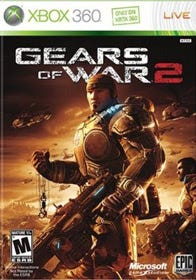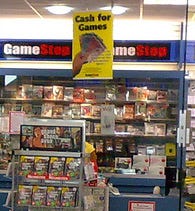Trending
Opinion: How will Project 2025 impact game developers?
The Heritage Foundation's manifesto for the possible next administration could do great harm to many, including large portions of the game development community.
Gamasutra goes in-depth on the used game controversy, with analyst stats on top resale genres and Frontier's David Braben weighing in on why the resale market keeps game prices "artificially high".

[Gamasutra goes in-depth with analysts and developers alike on the used game controversy, with stats on top resale genres and Frontier's David Braben weighing in on why the resale market keeps game prices "artificially high".]
Was there ever a time when the video games industry and the resale market weren't at odds? Only now, with the economy circling the drain, developers and publishers are expressing their annoyance a little more loudly, a little more frequently. After all, as sales dip, it's painful to watch your brand new $60 game sell for just 50 bucks used one week after its release.
But that's the business model retailers like GameStop depend on. According to Michael Pachter, GameStop -- which, he says, holds about 90% of the used-game market in the U.S. -- took in approximately $2 billion on pre-owned games this year, which is about a third of its $6 billion revenue on games altogether. Pachter is senior VP, research, at LA-based Wedbush Morgan Securities.
Indeed, those numbers on resales are bound to head upward, says Nick Williams, as gamers -- like everyone else -- look to save a few bucks during the deepening recession.
According to his survey of 2,000 gamers earlier this year, one in four buyers who hadn't bought any used games in the past year says they plan to buy a pre-owned game in the next 12 months. Williams is director of entertainment and media insights at OTX Research in Los Angeles.
The survey went on to say that 49 million gamers bought at least one used game in the last year and 26 million sold at least one game -- with 61% of the buyers having done their shopping at GameStop.
However, the OTX survey was released in March, prior to the economic plunge, which means that actual 2009 numbers could go significantly higher as bargain hunters find the lower prices of used games more suitable to their budget-minded tastes.
In a typical used-game transaction, says Pachter, a gamer will pay $60 for a new game, finish it in three weeks, and sell it back to a retailer like GameStop for $30 which then repackages it and puts it up for sale for $50.
 "I remember when the first Grand Theft Auto came out," recalls Pachter. "You couldn't find a used copy for over a year. People were so amazed by the game, they played it forever. But now that cycle has accelerated and every game is available used after just a couple of weeks."
"I remember when the first Grand Theft Auto came out," recalls Pachter. "You couldn't find a used copy for over a year. People were so amazed by the game, they played it forever. But now that cycle has accelerated and every game is available used after just a couple of weeks."
"You go into a GameStop intending to buy a new copy for $60 and the clerks are happy to tell you they can save you 10 bucks by selling you a used copy for $50. That's hard to resist. I mean, it's not like you're getting something that's dog-eared and unplayable. It's clean, looks the same, and has an instruction booklet."
If there's any doubt that the new-to-used cycle is now almost instantaneous, adds Pachter, "You ought to try it yourself. Call GameStop and ask them how much they're charging for Gears of War 2. They'll say $60."
"Then ask them if they have any used copies. I'll bet you anything they already have at least one. [Even if] the game's only been out for a week... You don't think that kind of thing gets the publishers pissed?"
Especially since the number and size of retailers in the user-game market are expanding. HMV recently announced that it is entering the used-game business in the UK, Dawdle.com is a new player, and a source within GameStop listed eBay, Amazon.com, and Play N Trade as its top competitors.
GameStop management chose not to comment for this article. However, in an interview with Gamasutra published in September, GameStop senior VP of merchandising Bob McKenzie and executive VP of merchandise and marketing Tony Bartel insisted that there really was no need for publishers to fear resales: "It's a significant amount of currency that we put back into the new gaming market -- over $700 million worth of games," said McKenzie.
"Over 80% of the trade credits go back toward new purchases," added Bartel. "I really think that when you look at the fact that 9% of the total currency spent on new games last year was generated out of one company's trade program, I guess you'd have to ask yourself, 'Okay, if that went away, how much would the industry suffer?'"
But David Braben considers such talk verbal misdirection and accuses the used-game market of defrauding developers and publishers. Braben is chairman of Cambridge, UK-based developer Frontier Developments.
"What the used games are doing is forcing publishers and developers to incur bandwidth costs for updates and support at least twice -- once for the game's first owner, then again for the owners of the used versions," he explains.
He recalls an incident years ago when he saw the sales figures for his company's game Frontier broken down by territory. There had been strong anecdotal evidence that there was considerable piracy going on in Italy but he hadn't known to what extent.
"I compared the sales figures to the number of tech support calls we were getting in Italy," he says. "Would you believe that we had sold only 100 or so games, but were receiving tens of thousands of support calls? It's that sort of thing that gets you thinking about the costs you incur from piracy and from pre-owned games.
"That's in addition to the fact that we don't see anything from the used-game sales, which is one reason why the price of new games throughout the industry remains artificially high," he says. "I mean, the industry has to make all its money from the first sale since we don't get a penny from the subsequent dozen or so sales of that same game."
 The used-game market may also be negatively affecting the quality of games, he notes. "Five years ago, a great game would have sold for a longer period of time than for a bad game -- which was essentially our incentive to make great games."
The used-game market may also be negatively affecting the quality of games, he notes. "Five years ago, a great game would have sold for a longer period of time than for a bad game -- which was essentially our incentive to make great games."
"But no longer. Now publishers and developers just see revenue the initial few weeks regardless of the game's quality and then gamers start buying used copies which generates money that goes into GameStop's pocket, nobody else's."
Braben also believes that the growing resale market will affect the genre of games developed. Because single-player and action games can be completed quickly by the gamer and then resold, he expects that fewer and fewer developers will choose to create those sorts of games.
And, indeed, OTX's research confirms that action games and shooters drive the resale market at 60% while only 20% are MMOs which take considerably longer to play. The main reason that gamers hold onto a title is replayability (69%) which is why the top two "keepers," OTX reports, are Guitar Hero III: Legends of Rock and Rock Band.
On the other hand, the titles that gamers had sold back to retailers most frequently were single-player games like Uncharted: Drake's Fortune, Assassin's Creed, and BioShock. "That illustrates that even great games will enter the resale market if there is limited re-playability," says Williams.
Braben insists that the industry needs to find new ways of incentivising the sale of new versions. "For instance, if we lower retail prices, gamers won't feel as much of a need to wait a few weeks in order to pay used prices," he says.
Developers should also come up with clever methods of increasing the value of new games, in addition to add-ons and expansion packs, he adds.
"As an example, Gears of War 2 offers downloadable multiplayer maps that you wouldn't get if you owned a pre-owned version," he says. "And many new games come with scratch-off codes for a weekend's free Xbox Live Gold."
Most everyone agrees that when the video games industry shifts to predominantly digital distribution, that, too, will bolster new game sales.
But that's a good 10 years off as only about 53% of homes in the U.S. currently have access to broadband, says Braben.
"It's forecast to rise to about 70% by 2012," he says, "but even then there are gamers who will still want to buy retail. For instance, there are some who like the portability of having a boxed game so you can bring it over to your friend's house."
In the meantime, the noise from the industry about used games is becoming louder, Braben reports. "Pre-owns have been around for years, but that sector has become acute this year. I've seen some chain shops in the UK where the new game section is less than 10% of the store; the rest is all pre-owned. That can't be good for our industry."
In recent months, industry execs such as Acclaim Games COO David Perry, Epic Games president Mike Capps, and Xbox Live Marketplace group program manager Alvin Gendrano have taken similar stands.
But industry analysts who see real growth in the resale market for 2009 say that isn't necessarily bad for the industry.
"A good analogy is used cars," explains Pachter. "If you were told by the auto makers that you could only buy a new car and you'd have to drive it until it was totally rusted and useless... and then throw it away because there's no resale market for your car... you'd be less likely to buy a new car as frequently as you do."
"GameStop's argument is that if you lose the currency from trade-ins, new sales will suffer -- and I'm certain that's true. So the publishers want their cake and eat it too. They want the used games business."
"They just don't want used game sales that cannibalize their new game sales. They are fine with the $20 used game. They're just not fine with the $50 game one week after it's released for $60."
And so, what do publishers intend to do about it?
"The only real meaningful threat," says Pachter, "is for publishers to stop supplying GameStop with packaged products. And, so far, nobody has made that threat. But, frankly, if it's not [Electronic Arts CEO] John Riccitiello or [Activision CEO] Bobby Kotick, it doesn't really matter. The other guys don't matter. I mean no disrespect to anyone else, but who cares what anyone else thinks?"
---
Photos by Stephan Mosel, used under Creative Commons license.
You May Also Like